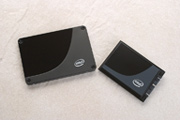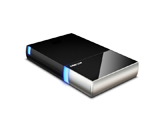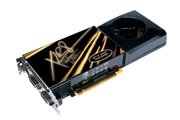|
E-Newsletter - September 2008
Contents:
Intel
X25-M 80GB Mainstream SATA SSD:
www.intel.com
Solid State Hits the Desktop |
 |
|
As we approach the tail end of 2008,
resellers will have tremendous opportunity to capitalize on
massive changes in several of Intel's product families. Perhaps
the highest-profile shift will happen in desktop processing,
where the current "Penryn" family will give way to the "Nehalem"
architecture---maybe the most significant change seen since the
original Pentium Pro's debut.
One side effect of Nehalem's advances is that
I/O will become an even larger performance bottleneck than it
already is, according to benchmarks shown at Intel's recent
Developer Forum in San Francisco. Expect the answer to be a
concerted shift away from magnetic storage and toward solid
state hard drives. Not surprisingly, Intel now has a mainstream
offering in that space called the X25-M, weighing in at 80GB and
armed with a native 3Gbps SATA interface.
Performance is unquestionably the X25-M's
strong suit. It's able to sustain sequential reads of up to
250MBps and sequential writes of up to 70MBps. The drive's read
latency is a scant 85 microseconds. And it only consumes 150mW
in a typical active state. Additionally, the drive is remarkably
robust, withstanding operating shocks of up to 1,000G with a 1.2
million hour MTBF. Intel says the secret to its unprecedented
performance is the X25-M's memory controller and
firmware---which employ a 10-channel architecture. |
top
Maxtor
BlackArmor 320GB Portable Hard Drive: $169
www.maxtor.com
Government-Grade Security
|
 |
|
On a seemingly regular basis we hear about
this business losing a laptop with sensitive customer data or
that government entity misplacing a flash drive with important
intelligence on it. Those stories go public specifically because
the data wasn't encrypted and, thus, compromised. Of course,
nobody thinks something like that will ever happen to them. But
that doesn't change the fact that you should be selling your SMB
customers on the virtues of encrypted storage ---especially when
it comes to a portable drive that they're taking on the road.
Maxtor's 320GB BlackArmor drive sports
hardware-based, full disk encryption that doesn't need to be
toggled on or off. The protection is always enabled, and nobody
can access the drive without a password. When asked about the
status of data if the password were to be forgotten, Maxtor
representatives almost-humorously replied that the information
would be lost. According to Maxtor, not even a professional data
recovery service can pull encrypted data from the BlackArmor.
And if you delete the encryption key, the entire drive can be
securely disposed of.
Although it's incredibly secure, Maxtor's
BlackArmor is still easy to use. The drive pulls enough power
over the USB interface to run on its own, without an external
adapter. A five-year warranty on the hardware makes support a
piece of cake, and the sub-$200 price tag pulls
industrial-strength data protection within easy reach of SMBs. |
top
PNY
XLR8 GeForce GTX 280 1024MB PCIe 2.0: $499
www.pny.com
3D Performance Fit for a King
|
 |
|
NVIDIA has claimed the high performance enthusiast market as
its home turf for quite a while, and if independent reviews can
be taken as gospel, the new GTX 280 processor is today's fastest
GPU. This is based on NVIDIA's GT200 core, a 65nm design
featuring 1.4 billion transistors. That's roughly twice the 754
million found in the preceding 9800 and 8800 parts, and it
explains why PNY's GTX 280 card is sheathed in a full-body
heatsink-fan shroud.
Of course, all that circuitry gets put to some amazing use.
PNY's GTX 280 features 240 unified shader cores, each clocked at
602MHz with a shader clock of 1296MHz. If you'd like more big
numbers, the GTX 280 boasts a processing speed of 933 gigaflops
and a texture fill rate of 48.2 billion per second. This is
facilitated through 1GB of DDR3 sitting on a 512-bit memory
interface, delivering a total memory bandwidth of 141.7GBps.
But that's all spec sheet stuff. All most users will want to
know is that the card dances all over most competing models in
the market. The feature-oriented crowd will want to know that
the card supports DirectX 10 and OpenGL 2.1, plus NVIDIA bakes
in the PhysX (physics) engine it purchased from AEGIA. Many
adapters only support HDCP decryption (required for Blu-ray and
HD DVD playback) on one port, but the GTX 280 is dual-link HDCP
capable, and the GPU builds in NVIDIA's PureVideo HD
technologies. These not only provide hardware acceleration for
HD decoding but also work to improve visual quality through
techniques like de-interlacing and noise reduction.
With that big heatsink, some users may wonder about power
consumption. True enough, the GTX 280 chugs down more than 200W
under load, which is why you see those dual power connectors
(one 6-pin, one 8-pin) built into the top of the card. But by
using technologies like clock gating, low power states, and the
kinds of dynamic frequency adjusting we're used to seeing in
today's CPUs, the GTX 280 can idle along at just 25W---a huge
improvement over the 60W in NVIDIA's prior generation.
PNY's dual-slot GTX 280 card is triple SLI-capable. The
company adds more value with extras like an HD breakout box,
internal HDMI audio cable, and a pair of DVI-to-VGA and -HMDI
adapters. At $499 list, this is no small investment, but there
are plenty of enthusiasts out there who demand top performance
and see the value in what PNY and NVIDIA bring to the table.
Serve it up with style. |
top
Last updated:
10/02/2008 01:08 PM
Enjoy your visit!
Support services and website data presented herein and on all subordinate sites are based upon technical information
provided by the manufacturers of the relevant products sold by Tech Data.
Tech Data believes this information to be accurate; however, Tech Data makes no representations or warranties with respect to the performance of the
support services and information, and any and all warranties, whether oral or written, expressed or implied, are hereby expressly disclaimed by Tech Data,
including, but not limited to, warranties of merchantability and fitness for a particular purpose.
|
Product Support |

|
HOME |
| |
|